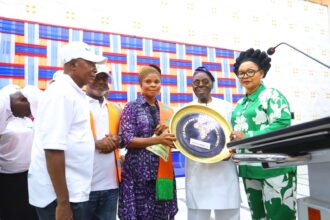Olawale Bamidele is a seasoned UX designer, mentor, and digital innovator who’s shaping how users interact with technology across Africa. With deep expertise in UI/UX design, product strategy, and motion graphics, he’s led transformative projects while building inclusive design communities through mentorship and education.
From his early days of self-learning to becoming a leading voice in Africa’s design space, Bamidele’s journey is powered by curiosity and purpose.Interviewer: What inspired you to step into the world of product design, and what continues to fuel that passion?
Olawale Bamidele: My interest started with simple curiosity. I often wondered why some digital platforms were so easy to use while others left users confused or frustrated. That question led me into the world of UX. What keeps me going is the ability to solve real-life problems and create experiences that make people’s lives easier.
Interviewer: A lot of people struggle at the start of their design careers. What hurdles did you face in the beginning?
Olawale Bamidele: When I was starting out, there weren’t many structured ways to learn. I had to teach myself and rely on online communities to grow. Building a reputation wasn’t easy either. I worked on a lot of different projects to gain experience, developed a solid portfolio, and learned how to communicate my ideas clearly. That helped me earn the trust of both clients and collaborators.
Interviewer: In your opinion, what sets an exceptional product designer apart from the rest?
Olawale Bamidele: Three things: curiosity, empathy, and the ability to solve problems. You need to stay curious so you keep learning. Empathy helps you understand real user needs. And solving problems is at the heart of good design. I also encourage young Nigerians to start small.
Redesign an app you use daily, take on real-life problems, and immerse yourself in design communities. That’s where growth happens.
Interviewer: You’re currently leading design at Scud Technologies. What’s your design process like in the mobility and logistics sector?
Olawale Bamidele: It starts with listening. We spend time talking to users: drivers, riders, dispatchers, to understand their struggles. The aim is to make complex processes simpler and easier to use, even for people who aren’t very familiar with technology.
Interviewer: Which tools or trends have influenced your approach recently?
Olawale Bamidele: Figma has been a game-changer, especially for collaborating with remote teams. I’m also excited about AI in design and creating more accessible experiences, especially in areas with low internet speed. For me, the most important thing is that a design works well before it looks good. Functionality is the foundation.
Interviewer: How do you approach collaboration in your projects?
Olawale Bamidele: I believe in working closely with everyone involved. Design doesn’t happen in a bubble. I talk to engineers to make sure the ideas can be built, and I coordinate with marketing teams to align on the message. Getting everyone involved early helps us create better products faster.
Interviewer: What’s next for you? Any big plans on the horizon?
Olawale Bamidele: Definitely. I want to expand UX Thrive into a global platform where African designers can showcase their skills and connect with opportunities: something that truly represents our talent. I’m also building an AI-based tool to make research easier for businesses.
And I’ve started writing a book, A UX Designer Mindset, to help upcoming designers find their footing in this space.
Interviewer: How do you see the future of design in Africa?
Olawale Bamidele: Africa has incredible potential. But we still need better access to training, mentorship, and funding. I believe we can lead in digital innovation if we design with our local challenges in mind. It’s about creating solutions that are relevant here, while also being strong enough to compete globally.
Interviewer: Finally, what would you tell someone just starting out in product design?
Olawale Bamidele: Focus on the fundamentals. Learn the core design principles, get comfortable with the tools, and keep practicing. Work on real projects, join communities, and stay consistent. Growth might take time, but if you’re committed, it will definitely come.








